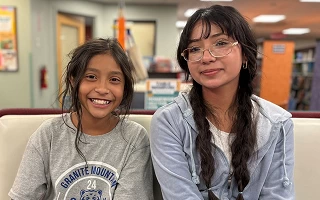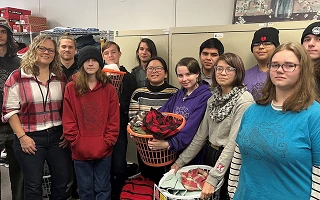Having a conversation with your teen can seem overwhelming, scary, anxiety ridden, and annoying. What if they ask me personal questions I’m not ready to answer? Is he/she even listening to me? If I get one more eye roll from that kid… and the list goes on.
Having a conversation with your teen can seem overwhelming, scary, anxiety ridden, and annoying. What if they ask me personal questions I’m not ready to answer? Is he/she even listening to me? If I get one more eye roll from that kid… and the list goes on.
North Star Youth Partnership, a program of Catholic Charities, is here to help! North Star engages youth ages 11-18 through educational, recreational, leadership and service-learning opportunities. What started in 1997 as an educational program to prevent adolescent pregnancy in Yavapai County has expanded to 11 different programs serving youth in Central and Northern Arizona.
Here are some key tips to having effective communication with your teen, because yes, they are listening…and watching.
- Be informed. Learn about the atmosphere where your teen lives. Learn about social media and the music they listen to. Know the latest trends. Be honest but be loving in your honesty. You may not like your kids’ music, but they do. It is okay to let them know you do not like it but be loving when you tell them. You can say something like, “It’s not my taste of music, but I’m glad you’ve found something you like.”
- Don’t judge. Being critical, judgmental, or making fun of what your child likes or is saying becomes an insult, and your teen can become defensive and may not want to communicate anymore. If your teen likes a certain movie or show and hears a parent criticize those who watch that show, your teen will most likely internalize that criticism and feel as if the parent is judging him/her. “This show is so stupid. I don’t know why anyone would watch this.” Could easily turn into the teen thinking, “My parent thinks I’m stupid.”
- Control your emotions. Your teen just did something and all you can think is, “What were you thinking?” You want to cry or yell or both…not a good idea. Stay calm. Talk with your teen. If they think you will get emotional every time they come to you they are less likely to talk to you about their problems. Yell or cry in a different space.
- Tell them why. Teens need facts. Back up your boundary or feelings with facts. They may roll their eyes, but they are listening. They need facts, because many teens feel like their parents don’t understand or know anything.
- Don’t assume. Your teen may not share your beliefs, they may be struggling even if they aren’t showing it, they may be feeling stress, or they may be testing boundaries. Teens are inundated with many different beliefs and messages.
- Listen. Ask open ended questions and listen. Let them speak without interruption or judgment. They need to feel safe to speak to you. Allow them to ask questions.
- Be prepared. Your teen may ask questions about your past. Be prepared for your answers. Practice before your conversation with your teen.
You want to be your teen’s “exit strategy”. You want your teen to feel say he/she can count on you no matter the situation. Let them know you come from a place of care not control. Create a code word with your teen, so if they are in a situation where they need you, they can use it so you can help them…no questions asked…for now. We can talk later. Teens do want boundaries, and they want to feel safe with their parents. Acknowledge your differences and above all, let them know you love them.
Support North Star
It is North Star’s mission to value youth and help empower them to be healthy, self-assured individuals that make a difference in their communities. Each year, we strive to achieve that mission. Support our work in creating a brighter future for youth.








